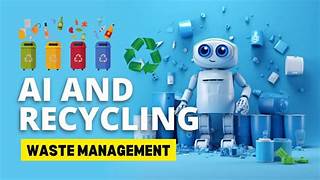AI for Managing Industrial Waste and Recycling Processes: A Comprehensive Guide
In the era of environmental awareness and stringent regulations, industries are under increasing pressure to manage waste effectively and adopt sustainable practices. Industrial waste, ranging from hazardous chemicals to electronic scrap, poses significant challenges for organizations striving to minimize their environmental impact. Artificial Intelligence (AI) has emerged as a transformative technology in managing industrial waste and optimizing recycling processes. This article explores how AI is revolutionizing waste management, the benefits it offers, and the challenges involved.
The Role of AI in Industrial Waste Management
AI technology is reshaping the landscape of waste management by automating processes, enhancing decision-making, and optimizing recycling. Key applications include:
- Waste Identification and Sorting AI-powered systems use computer vision and machine learning algorithms to identify and classify waste. Advanced sensors and cameras integrated with AI can distinguish between materials such as metals, plastics, and organic waste, facilitating efficient sorting and recycling.
- Predictive Waste Generation Analysis AI models analyze historical and real-time data to predict waste generation trends. By understanding patterns, industries can plan waste management strategies more effectively, reducing overflow and ensuring timely disposal.
- Optimizing Recycling Operations AI-driven robotics and automation streamline recycling processes. Robots equipped with AI algorithms can sort recyclables with high precision, reducing contamination and improving material recovery rates.
- Hazardous Waste Management AI systems help detect and handle hazardous waste more safely. By analyzing chemical compositions and monitoring conditions, AI ensures compliance with safety standards and reduces risks.
- Real-Time Monitoring and Reporting IoT devices connected to AI platforms provide real-time insights into waste levels, enabling proactive management. For example, smart bins equipped with sensors can notify waste management teams when they need emptying.
Benefits of AI in Waste Management and Recycling
The integration of AI into waste management processes offers numerous benefits:
- Efficiency and Cost Savings By automating sorting and recycling, AI reduces manual labor costs and increases operational efficiency. This leads to significant cost savings over time.
- Improved Accuracy AI systems are highly accurate in identifying and sorting materials, minimizing errors and contamination that can lower the quality of recycled materials.
- Environmental Impact Optimized recycling processes and better waste management practices reduce the volume of waste sent to landfills, lowering greenhouse gas emissions and promoting sustainability.
- Regulatory Compliance AI ensures adherence to environmental regulations by monitoring waste management practices and generating compliance reports automatically.
- Enhanced Decision-Making AI-driven analytics provide actionable insights, helping industries make informed decisions about waste management strategies and resource allocation.
Case Studies: AI in Action
- Plastic Recycling with Computer Vision Companies like Amp Robotics use AI-powered robots to sort plastic waste. These robots identify different types of plastics based on their physical and chemical properties, ensuring efficient recycling and reducing contamination.
- Hazardous Waste Management in Chemical Plants AI systems in chemical industries monitor the generation and disposal of hazardous waste. Predictive models forecast potential risks, enabling preventive measures and ensuring compliance with safety standards.
- E-Waste Recycling AI is transforming e-waste recycling by automating the dismantling of electronic devices and recovering valuable materials such as gold and silver. This not only reduces waste but also promotes circular economy principles.
Challenges in Implementing AI for Waste Management
Despite its potential, implementing AI in industrial waste management comes with challenges:
- High Initial Investment Developing and deploying AI systems requires significant investment in technology, infrastructure, and expertise.
- Data Quality and Availability AI relies on high-quality data for training and operation. Inconsistent or incomplete data can hinder the performance of AI systems.
- Resistance to Change Industries may resist adopting AI-driven solutions due to concerns about cost, job displacement, or unfamiliarity with the technology.
- Ethical and Regulatory Concerns Ensuring data privacy and addressing ethical concerns about AI decision-making are critical for widespread adoption.
- Complexity of Waste Streams Managing diverse and complex waste streams, such as mixed industrial waste, requires advanced AI algorithms and robust systems.
The Future of AI in Waste Management
The role of AI in industrial waste management is expected to expand as technology advances. Key trends include:
- Integration with IoT and Blockchain Combining AI with IoT devices will enhance real-time monitoring and control of waste management processes. Blockchain technology can provide transparency and traceability in waste handling and recycling.
- Development of Circular Economy Models AI will facilitate the transition to circular economy models by optimizing resource recovery and promoting the reuse of materials.
- Advanced Robotics The development of more sophisticated AI-driven robots will further automate recycling processes, improving efficiency and reducing costs.
- AI-Driven Policy Formulation Governments and organizations may use AI analytics to design policies that promote sustainable waste management practices and reduce environmental impact.
Conclusion
AI is revolutionizing the management of industrial waste and recycling processes, offering unparalleled efficiency, accuracy, and sustainability benefits. While challenges remain, the advantages of integrating AI into waste management systems far outweigh the obstacles. As industries continue to prioritize environmental stewardship and regulatory compliance, AI will play a pivotal role in achieving these goals. By embracing AI-driven solutions, businesses can not only reduce their ecological footprint but also enhance their operational efficiency and competitiveness in an increasingly eco-conscious market.


